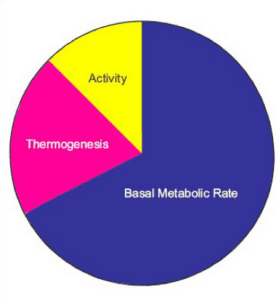
Basal Metabolic Rate, or BMR, tells you how much energy that your body needs to perform vital functions, i.e. for your organs to work, whilst at rest.
The two numbers are closely related – the higher the BMI, the higher the BMR tends to be and you can work both of them out here.
BMI Scale
A healthy BMI is considered to be between 18.5 and 24.9. An underweight BMI is anything below 18.5, an overweight BMI is between 25 and 29.9, an obese BMI is between 30 and 34.9, an obesity II BMI is between 35 and 39.9 and a morbidly obese BMI is anything over 40.
A morbidly obese BMI is associated with a greater risk of heart disease, heart attack and problems such as high cholesterol and kidney problems. A BMI below 18.5 is considered to be an unhealthy weight and is associated with brittle bones and in women, amenorrhea.
Calculating BMI
Your BMI is calculated by dividing your weight in pounds by your height in inches squared. Alternatively, you could use our online calculator.
BMR
Several different factors go into determining your BMR, such as your weight, height, age, sex, how active you are and the type of food you eat. Your BMR has the most significant impact on your body’s energy requirements – it accounts for about 60-70% of your daily requirements, whilst the food you eat counts for about 20-30% and the activity you do counts for about 10-20%.
Calculating BMR
Calculating your BMR is a bit of a complicated process and so the easiest way to do it is using our online calculator. The formula is different for men and women, as men naturally require more calories to perform basic vital functions than women plus if you are breastfeeding you need to add an extra 300-500 calories a day to your BMR number
Using your BMI and BMR
Knowing your BMR will tell you how many calories per day that your body needs to perform all of its vital functions. You can use that number to then work out how many calories per day you need to be eating to lose weight.
Understanding BMI
Although BMI is just numbers, these numbers can sometimes be deceiving as they do not take into account how much muscle you have or what your lifestyle is.
A BMI over 25 doesn’t mean that you are obese, not necessarily – you could have a muscular body or you could eat well and get plenty of exercise. It’s important to remember that it is your lifestyle that is important, not your BMI. BMI is supposed to be a guideline, and your doctor will be able to tell you more accurately whether or not your current weight is healthy.
To see our weight loss plans that can help your BMI and BMR click here
